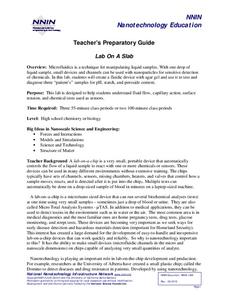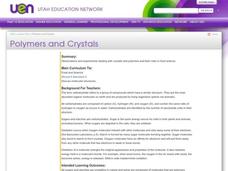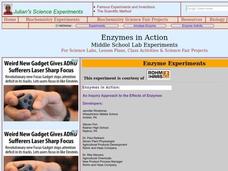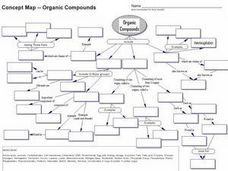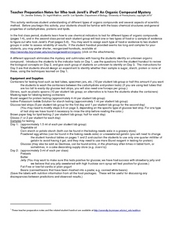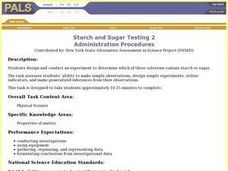Curated OER
Testing for Life’s Molecules
Want to hear a joke about sodium? Na. Young scientists test various materials to identify if they include protein, starch, and glucose by using the Biuret test, iodine starch test, and Benedict's test respectively. After practicing with...
Serendip
Photosynthesis and Cellular Respiration
How does energy from the sun make plants grow? Scholars move step by step through the processes that promote plant propagation during a detailed lesson. The resource illustrates ADP production and hydrolysis, then allows learners to...
Serendip
A Scientific Investigation – What Types of Food Contain Starch and Protein?
You are what you eat, as they say! Are you more starch or more protein? Young scholars use their knowledge of each component to test different foods for their content. Using multiple indicators, individuals describe the protein and...
National Nanotechnology Infrastructure Network
Lab On A Slab
Capillary action is the frugal chemist's dream ... the less liquid used, the more tests they can run! Learners experiment with the best design to maximize the benefits of capillary action. Using a liquid sample, they design a capillary...
Nuffield Foundation
Making a Calibration Curve for Starch Concentration
How well can your class concentrate on solutions? Scholars use colorimeter absorption to explore a starch concentration calibration curve. They add iodine to different starch solutions to see how the concentration of the solution changes.
Nuffield Foundation
Digestion of Starch: Microbes
Sugar isn't good for you, but it's great for microbes. A simple experiment has pupils investigate the digestion of starch by microbes to produce sugars. They apply two bacterial cultures, an amylase solution, and distilled water on a...
Curated OER
Macromolecule Lab
During a macromolecule lab, young chemists perform multiple tests, including iodine starch tests, to determine if eight mystery foods contain lipids, sugars, or starches.
Curated OER
Light and Starch Production in Photosynthesis
Students are given the unique opportunity to see the contrast between parts of a leaf that have photosynthesized and parts of the leaf that have not. This visual image helps students see the results of this biological process. At the...
Curated OER
Polymers and Crystals: Their Role in Food Science
Blend chemistry with cooking in this exploration of polymers, carbohydrates, and food science. Experimenting with gelatin produces concrete examples of the bonding and ploymerization discussed in the lesson. Copious, comprehensive...
Curated OER
Starch
Learners examine the basics of starch and how it is used in food. In this photosynthesis lesson students experiment with variables that affect starch production in photosynthesis.
Curated OER
Starches, Fats And Sweets, Oh No!
Students log their food intake for one week and analyze their diet using the food pyramid. They then design a week of nutritional meals and snacks for a young child that they might baby-sit.
Curated OER
Enzymes in Action
Young scholars explore how enzymes are important in the chemical reactions of all living things. In this enzymes and catalysts lesson students complete an activity to see how enzymes change living things.
Curated OER
Photosynthesis: A Controlled Experiment
Students investigate the amount of starch in a plant under 3 different conditions. In this photosynthesis lesson plan, students compare the amount of starch in a plant with increased carbon dioxide conditions, a plant with decreased...
Curated OER
Irish Potato Products
Students investigate the effects of low and high temperatures on potato products. In this potato products lesson plan, students demonstrate the effects of storage conditions on Irish potatoes. They investigate the effects of frying, they...
Curated OER
Concept Map - Organic Compounds
In this organic compounds, students complete a graphic organizer by placing 36 vocabulary words into their correct places in the concept map.
Curated OER
Nutrient Analysis Lab
In this nutrient analysis lab worksheet, students perform several experiments in a lab setting. Students test products for carbohydrates (monosaccharides and polysaccharides), proteins, lipids, and starches.
Curated OER
Who Took Jerell's iPod?
Students investigate various substances to determine the perpetrator of a crime. In this biology lesson, students test for the presence of organic compounds in various samples. They identify an unknown substance based on its physical and...
Curated OER
Amylase
Students examine what amylase is and its history. In this digestive lesson students study the effect amylase has on starch and how temperature affects the rate of activity.
Curated OER
Starches and Fats
Students observe the presence of starches and fats in different foods. In this science lesson plan, students distinguish between a food that contains starch and a food that contains fats, define the terms starches and fats, and classify...
Curated OER
Biologically Important Molecules
In this biologically important molecules learning exercise, students fill in the blank with information about carbohydrates, lipids, and proteins. Students also make notes about nucleic acids.
Curated OER
Starch is Everywhere
In this science activity, students add a few drops of iodine solution to each of 10 substances to determine if they contain starch. The iodine will turn blue if the item contains starch.
Curated OER
Starch and Sugar Testing 2
Students design and conduct an experiment to determine which of three solutions contain starch or sugar. This task assess students' ability to make simple observations, design simple experiments, utilize indicators, and make generalized...
Curated OER
The Nutritional Content of Food
High schoolers are given three unknown samples and must perform two chemical tests in order to determine if the samples contains protein and/or starch. Students work with corrosive or toxic reagents.
Curated OER
Monomer and Polymer Chemistry
Students explain monomer/polymer chemistry of starches and sugars.





